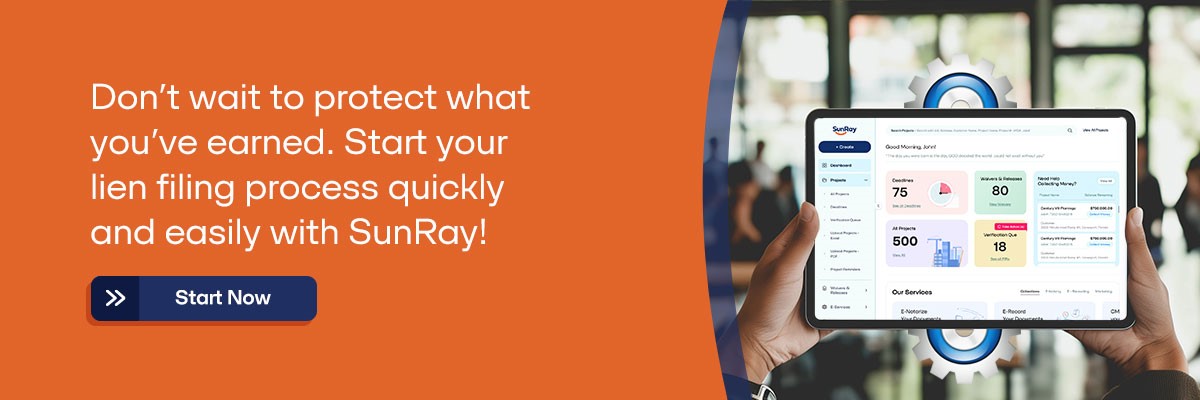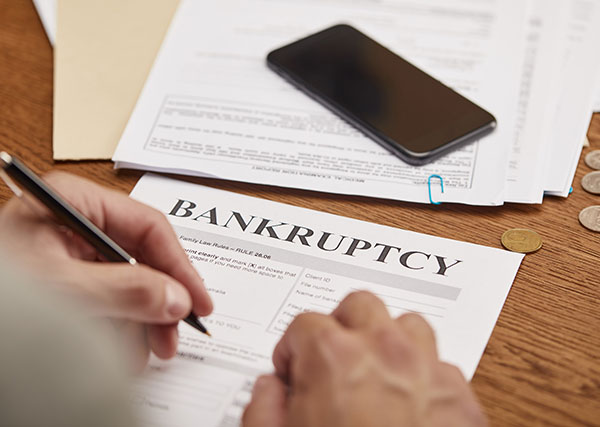What Happens After I Record My Lien? Virginia Webinar
Filed a lien in Virginia? Learn what comes next. Discover how to enforce your lien rights and get paid faster.
Last updated:
Feb
18
,
2026
Published:
April 30, 2025
5 mins
Read
Mechanics liens serve as a powerful tool for contractors, subcontractors, suppliers, and laborers to secure payment for their work on a property.
In this webinar, presented by SunRay Construction Solutions, attorney Ryan Suit of Pender & Coward (Virginia) will guide us through the essentials of mechanics liens in Virginia—offering valuable insights into lien rights, timelines, enforcement procedures, payment issues, and best practices. Here's a detailed overview for anyone working in the construction or real estate industry in Virginia.
Mechanics Lien Refresher: Who Can File?
In Virginia, any individual or entity providing labor or materials worth $150 or more to a construction project is entitled to file a mechanics lien. This includes general contractors, subcontractors (including multiple tiers), material suppliers, and laborers. Given the current cost of construction services, nearly every contributor to a project will meet or exceed this $150 threshold.
The Importance of Strict Compliance

Virginia is known for strictly enforcing lien requirements. Perfecting a lien involves several non-negotiable steps:
- Detailed Memorandum of Lien: This document must accurately describe the property, the work performed, and the land associated with the improvements.
- Notice and Mailing Requirements: These steps are essential to keep all parties informed and ensure legal compliance.
- Accuracy: If the lien lacks detail or contains inaccuracies, a court may deem it unenforceable.
For professionals needing a deeper understanding, here are prior webinars with legal experts for further guidance.

Critical Timeline Requirements
The timeline is perhaps the most important aspect of lien enforcement in Virginia. Missing deadlines is the easiest way to lose lien rights entirely.
- Recording Deadline: A mechanics lien must be filed within 90 days of the last day of the month in which the final work was completed. For example, work completed on April 16, 2025, would require lien filing by July 29, 2025 (90 days after April 30).
- 150-Day Rule: The lien can only cover work performed within 150 days prior to the last day of work. In the same example, that would include work performed on or after November 17, 2024.
These deadlines are hard and fast. Inaccuracies or late filings can result in the complete loss of lien rights.
Enforcing a Mechanics Lien
Even a properly recorded lien is meaningless unless it’s enforced on time. Virginia law requires that enforcement occur either:
- Within six months of the lien’s recording date, or
- Within 60 days of the project’s completion or termination — whichever is later.
Enforcement is done by filing a petition with the court — not a general complaint. This specific requirement under Virginia Code § 43-17 makes it clear that a petition is the proper means of enforcement. Virginia allows lien claimants to file on the last allowable day, unlike states like Vermont, where a hearing must be held before the deadline.
When filing the petition, certain documentation is required:
- An itemized statement of accounts
- A description of the labor or materials provided
- Payment history and the outstanding balance
Once submitted, a judge will review the petition, hold a hearing, and determine if the lien is valid. If upheld, the court may order a judicial foreclosure sale, where proceeds from the property sale are used to pay off the lien. If the lien is found to be inaccurate or invalid, it will be dismissed.

Payment and Bonding Off Liens
Receiving payment doesn’t automatically resolve lien issues. It's critical to secure a signed release only after payment is confirmed and cleared — preferably through certified funds or wire transfers. Digital payment platforms like Venmo or Cash App carry risks due to potential reversals or account closures.
Importantly, if payment is delayed and the deadline to file a petition approaches, lien claimants should still file. Once payment is received, the case can be withdrawn. But if a deadline is missed without enforcement, the claimant loses their lien rights and leverage.
Property owners may also bond off a lien, meaning they either:
- Deposit sufficient funds with the court, or
- Post a surety bond worth twice the lien amount (per Virginia Code §§ 43-70 and 43-71)
This allows the project to proceed while the court resolves the lien.
Priority of Liens in Virginia
Mechanics liens in Virginia are notably powerful. They often take priority over other claims, including judgment liens, and sometimes even mortgages (referred to as “deeds of trust” in Virginia). While this is determined case-by-case, it significantly enhances the value of a properly recorded mechanics lien.
Releasing the Lien
Once payment is received, it’s essential to formally release the lien by filing the appropriate document with the same court in which it was recorded. Failure to release a paid lien can lead to serious consequences, including court petitions from the property owner and potential claims for attorneys’ fees, court costs, or even sanctions.
Notice to Owner Florida – Don’t Risk Your Lien Rights
Stay compliant with Notice to Owner Florida requirements. Send your Notice to Owner today and protect your payment.
Final Tips and Best Practices
To wrap up, the presenter offered some practical advice:
- Review Your Contract: Make sure it’s current, clear, and compliant with Virginia laws.
- Stay Licensed: A lapsed license — even due to a missed $50 renewal fee — can jeopardize your right to enforce contracts.
- Define Scope and Payment Terms: Ambiguity in scope of work or payment schedules often leads to disputes. Spell everything out clearly.
- Avoid Waiving Your Lien Rights: Some contracts contain clauses that waive lien rights upon submitting a payment application. Read the fine print carefully.
Even if lien rights are waived or a lien is deemed invalid, it’s not the end of the road. Contractors and suppliers can still pursue breach of contract claims through the court system.
Protect Your Rights with a Notice to Owner
Sending a notice to owner is the first step to secure payment on construction projects. Learn how a notice to owner Florida helps protect your lien rights and ensures you get paid.
Protect Your Payment Rights with Florida’s Most Trusted Notice & Lien Services
Notice to Owner – Secure your lien rights early. File your NTO now!
Notice to Owner Florida – Stay compliant with Florida deadlines. Send your NTO today!
Mechanics Lien Florida – Get paid faster. Start your Florida lien process now!
Key Takeaway
Mechanics liens in Virginia offer strong protections, but only if claimants meet strict legal requirements and deadlines. By understanding these rules — and working with legal professionals when necessary — contractors and other construction professionals can protect their rights and ensure fair payment for their work.
To better understand your lien rights, check out our guides on the Notice to Owner Florida and the Florida Mechanics Lien.

If you have questions about your specific lien situation or need guidance with filings, enforcement, or contract review, it’s always a good idea to consult with a construction law attorney experienced in Virginia’s mechanics lien laws.
Common Questions Contractors Ask
1. If I’m a subcontractor to a subcontractor (2nd-tier) on a commercial project in Virginia, do I need to send a Notice to the Mechanic’s Lien Agent (MLA)?
No, not unless a Mechanic’s Lien Agent is actually listed on the building permit.
- Under VA Code §43-4.01, notice must be given to the MLA only if one is designated on the permit.
- If no MLA is appointed, no notice is required.
- 1st-tier and 2nd-tier subcontractors on commercial projects generally do not need to send notice unless the MLA is listed.
2. What is the deadline to send the Notice to the Mechanic’s Lien Agent (MLA) on residential projects?
For residential projects (1- or 2-family dwellings):
- Notice must be sent within 30 days from first furnishing labor or materials.
- If notice is given after the 30-day period, the lien will only cover the work performed within the 30 days prior to the date notice was sent.
3. Once I’ve filed my lien in Virginia, am I required to serve the lien notice on the owner?
It depends on your role:
- General Contractors:
Yes. Under VA Code §43-4, you must file a certification of mailing showing you sent a copy of the lien to the owner via certified mail.
- Subcontractors/Material Suppliers:
No. Under VA Codes §43-7 and §43-9, you only need to provide written notice to the owner—certified mail or service is not required.
4. Is personal service or use of a process server required for serving a lien notice in Virginia?
No. There is no requirement to use a process server, even for liens over a certain amount.
- Certified mail is sufficient for general contractors.
- Subcontractors/materialmen only need to provide written notice—no specific method of service is required.
Sunray Construction Solutions offers professional "Notice to Owner Florida" services to help you secure your mechanics lien florida rights in the construction industry. Looking for a free Notice to Owner form in Florida? Get your free, editable "Florida Notice to Owner Template" today for easy and accurate preparation.












